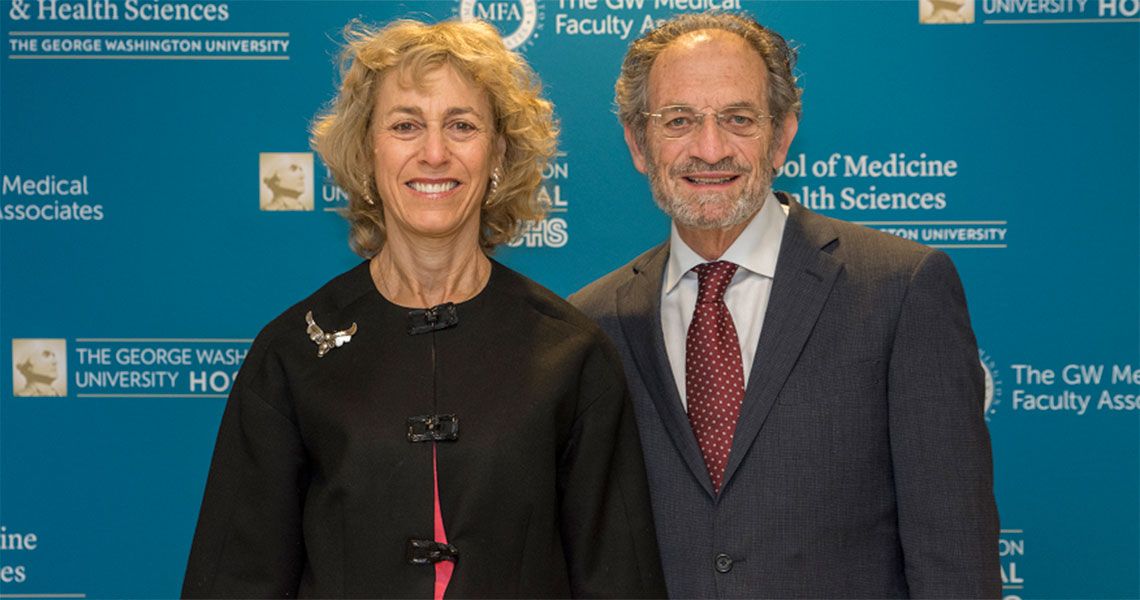Lalo Panyagua always looked after his “baby birds,” the soldiers under his command in Iraq, said Nancy Sherman, Ph.D., professor in the Department of Philosophy at Georgetown University. Having grown up in a rough neighborhood in Los Angeles, Panyagua had a broad protective streak that thickened when he joined the military; that streak also caused him immense anguish.
“Lalo’s sure he always told his guys, ‘Watch your bearings, check for mines,’” Sherman said. “But he’s not sure this time he did.”
One of Lalo’s soldiers, Corporal Justin Wilson, needed to make a pit stop. Wilson got out of the vehicle, and was “pulverized,” Sherman said. “Never leave a fallen comrade behind. That means for these guys, the closest in command picks up the body parts.”
That task fell to Lalo. “[It meant] six hours of collection of tissue and bone,” Sherman said.
Lalo’s story — one of several Sherman recounted — came at the 36th Annual Daniel S. Prager, M.D., Endowment Lecture in Psychoanalytic Psychiatry, cosponsored by the Washington Center for Psychoanalysis, May 19. Prager’s friends and colleagues endowed the lecture in order to bring leading psychoanalytic thinkers to GW, said James Griffith, M.D., the Leon M. Yochelson Professor and chair of the Department of Psychiatry and Behavioral Sciences at the GW School of Medicine and Health Sciences.
“I often think of endowed lectures such as the Prager Lecture as the best evidence that the good people do lives long after them,” said Griffith.
The “good” people do — or the goodness people have — was a central theme in Sherman’s lecture, “Moral Injury: Binding the Moral Wounds of War.” Moral injury, she explained, refers to how war “wracks [service members] through guilt and shame, but also resentment,” she said. “As some psychiatrists would like put it, [moral injury is] how [service members] seem to sometimes lose a sense of moral identity, a shattered sense of their goodness or their worth.”
Sherman — who emphasized that she is a philosopher, not a clinician — believes that culpability plays a particularly strong role in moral injury.
“Moral injury has degrees; it’s spectral; it ebbs and flows; it can be apt and inapt, that is, it can attract real culpability but also apparent culpability, an apparent sense of falling short,” said Sherman. “I think that’s critical, because too often, [authorities] are ready to dismiss moral anguish when it doesn’t really track the objective wrongdoing out there.”
In other words, service members are kept to such a high moral standard, a code of “never leaving anybody behind,” and “bringing home all of the troops,” that they can only meet those standards imperfectly, at best.
“With young minds, the frontal cortex is not fully formed; [there’s] too little sleep; the autonomic nervous system is on fine-trigger; and the sense that you didn’t do everything you possibly could or should leaves long, long lines of residue,” Sherman said.
Those feelings of guilt, shame, and responsibility, she added, can be mitigated by self-empathy, hope, and trust.
In Lalo’s case, as he struggled with feelings of guilt that he should’ve prevented Wilson’s death, his wife, Donna, came in as his “angel,” Sherman said. Donna played a critical role in reminding Lalo of his worth and his capabilities. More specifically, she displayed “normative hope.”
“It’s not just hope for outcomes and that things will work out, it’s investing in someone with goals that you think they can be capable of, despite the internal and external challenges,” Sherman explained. “She was investing and hoping in him regularly.”
Lalo eventually recovered, thanks to Donna, as well as his care dog, Max, and the Vietnam veterans he bonded with at Vinson Hall Retirement Community.
Major Jeff Hall, another of Sherman’s morally wounded, had a different approach to healing. Hall, who had enlisted in the military at age 17, was, Sherman said, a good person. He was the mayor of a local community, he painted schools, he laid sewers, he brought medical aid to people. “But he thinks that what you do as an Army guy is engage and destroy an enemy, so war was very unsettling for him,” Sherman said.
In the Mansur district of Iraq, Hall’s desire to perform good acts, to be a good person, directly conflicted with his military responsibilities. One Sunday, a Christian family, returning home from church, was caught in a crossfire, and the mother, father, and son were killed. Hall was designated as the liaison between the remaining family members and the military.
Hall worked for nine months to retrieve the bodies for the family, though the bodies were unrecognizable by that point. The family also asked for the death certificates so they could perform a proper burial, and Hall had to fight through bureaucratic red tape to get them.
“The Ministry of Health gives them out; in red bold letters is stamped ‘Combatant Enemy,’” Sherman explained.
After returning stateside, Hall’s wartime experiences left him nearly suicidal. “For this particular soldier, he not only lost his arsenal, but he felt he lost his goodness,” Sherman said. “The only competence he had, which was being a good father, a good person, was effaced every time he tried to be a good, decent person.”
Hall was sent to Walter Reed National Military Medical Center, where he became involved in art therapy. Making masks depicting his feelings helped him to process his “moral injuries,” Sherman said. Music therapy, she added, can also be beneficial, particularly for those service members struggling to articulate their feelings into words.
Sherman believes that keys to healing include acknowledging that perceived transgressions are true causes of suffering and that military units should maintain contact after deployments through social media. She also believes that Veterans Affairs care should be improved, and service members should take advantage of non-clinical spaces for healing, such as classrooms.
“It’s about trying to help service members [who] are returning to morally and psychologically process their wars,” she concluded.



